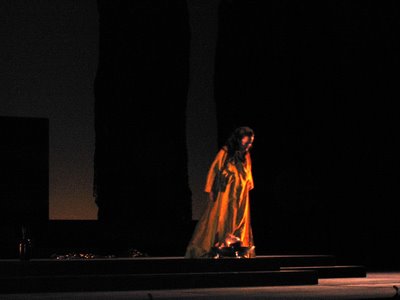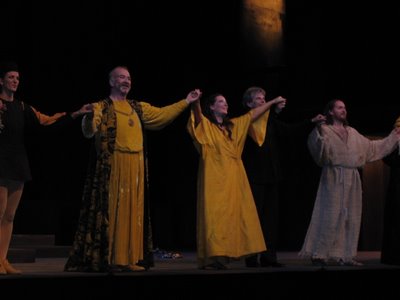
AS ALWAYS, CLICK ON IMAGE TO VIEW LARGER
Pictured: Sunday, 22 October 2006; Renaud Delaigue (Curio), Sonia Prina (Cornelia), Franco Fagioli (Tolomeo), Christophe Rousset (conductor), Rosemary Joshua (Cleopatra), Andreas Scholl (Giulio Cesare), Mario Cassi (Achilla), [supernumery], Alice Coote (Sesto), [supernumery]
I attended opening night of this new production at the Théâtre des Champs-Elysées in Paris. I returned for the final two performances. (In between the first and the fourth performance, I attended two other events at this venue, and I sat in the same section all five nights. You can bet they know me there!)
Without question the big news about this production is its star, Andreas Scholl. Christophe Rousset (who grooves like no other conductor I've seen) led Les Talens Lyriques, and Irina Brook headed the stage production.
Opening night was not an overwhelming success. The orchestra sounded dry. The audience was not enthusiastic about the production. During curtain calls, Brook was booed off the stage.
Things were entirely different on Sunday. I noticed not only the excellent singing of the cast, but also the warm playing of the orchestra. Also, I was surprised to observe that the production worked. There's nothing genius about it; it's a simple set consisting of sand dunes and some sight gags. But I found that it never distracted from what was happening, and so what if there were some cheap laughs? I was entertained, and, most importantly, I heard these voices.
I'll start with the other countertenors, Damien Guillon and Franco Fagioli, who are both my age (born in 1981). Nireno doesn't sing very much, but I like what I heard of Guillon's voice, and, with his spiked hair, he certainly had a presence on stage. I very much liked Fagioli as Tolomeo. Grotesque and decadent, this was a Tolomeo who swaggered about in purple, showing skin when he probably shouldn't. It is quite extraordinary to see such a young singer wield such a strong dramatic presence. As remarkable is the voice: loud, dark but not hooty, with a powerful lower register and a gleaming (but underused) top.
I heard Rosemary Joshua sing Cleopatra with David Daniels in Miami in 2000. I remember liking her then, and her performances here indicate that she loves singing this rather demanding role. The arias are difficult, to be sure, and, while I haven't done the math, I'm certain that Cleopatra sings quite a bit more than Cesare. Joshua's pretty voice is ideal for Handel. Her lines are clean, her coloratura clear as a bell, and her ornaments seem faithful to the music. (She did not interpolate many high notes--I doubt there was anything above A--but I did not miss them.) This is another singer with remarkable stage presence. A joy to watch on stage, she danced through this role--often literally, using moves that seem inspired by Madonna's "Don't Tell Me" video.
Recent Met debutante Alice Coote is one of the most impressive younger singers I have heard lately. (Elina Garanca is another.) Her beautiful, rich sound is largish, and at the end of her first aria--Handel certainly wrote Sesto some damn good solos--she unleashed the highest and loudest note of the evening. Her "Cara speme" was breathtaking, with seamless legato and shimmering tone to spare. She will sing Sesto in the Met revival this spring.
Speaking of breathtaking, on Sunday in particular, Scholl floored me with his gorgeous "Aure, deh, per pietà," whose opening phrase he started singing softly, gradually increasing the volume. (He does a similar thing at the opening of "Dove sei, amato bene" in Rodelinda.) This role also gives him plenty of chances to show off his dazzling coloratura. Scholl, who stands 6'5" (I haven't confirmed this; I heard it from a very famous recent Met costar of Scholl's), looked every bit the part as the ruler of the world. Still, he has a youthful presence, and also comes across as very warm and self-effacing. Sporting a Caesar cut and a light beard, he looked quite smart, especially in the tailored suit in the final scene.
The one dreadful part of the production: the horrible playing from the horns. What happened? All three nights. The boos were deserved. "Va tacito e nascosto", which is supposed to be a high point, was ruined, as were parts of the final scene.
Finally, I have to compliment the make-up artists, who made everyone look great.











